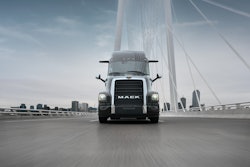
This year is the pause button, a panel of trailer OEMs said Thursday at the National Trailer Dealers Association (NTDA) Convention in Indian Wells, Calif.
Moderated by Lynn Simon, president of OneWayTrailers.com, the panel included Robert Ulsh from Great Dane, Bill McKenzie from MAC Trailers, Jeremy Sanders from Stoughton and Al Cox from Fontaine.
“Right now, it seems like people hit the pause button,” McKenzize said. “Most businessmen want to see the other side of the room. Until they can see that, it will stay paused.”
Interest rates are hurting equipment manufacturers, McKenzie says, as in inflation.
“It’s not just the grocery store. It’s buying equipment,” he said.
“We’re just in this little funk right now,” Cox added.
But where there’s a pause button, there’s also play. Eventually, the cycle will shift upwards again. The OEMs represented universally saw labor as a problem when it does.
[RELATED: FTR's Starks offers better outlook for 2025 trailer space]
“When this thing does shift, we need to be sure we’re all prepared to answer the bell,” Ulsh said.
That means building relationships with nearby schools and young people to get them interested in manufacturing jobs and jobs across heavy-duty trucking.
“Workforce preservation is really important in this industry,” Sanders said. “It’s tough right now.”
All of the OEMs reported issues in both their plants and dealerships maintaining institutional knowledge in their workforce.
McKenzie said it was important to treat workers of all ages and skill levels “like family,” especially the younger ones.
[RELATED: Finding a good employee is more technical than ever]
“Where’s the youth going to come from,” McKenzie asked the room. “That’s what scares me. I see the youth and I don’t see the energy and the passion we all had when we grew up in this industry.”
Sanders said the industry as a whole was getting older and it was difficult capturing younger talent. All of that said, “you can’t put all the onus on the kids,” Ulsh said. “We raised them.”
He’s confident that, when the time comes, they’ll rise to the occasion.
“They’re going to help us get the answers,” he said.
Technology could play a role in attracting younger talent, the panel said, especially tech that helps integrate the trailer and the power unit and tech that supports electrification.
“That’s a tremendous trend that I don’t see going away,” Ulsh said.
With electrification comes weight and cost concerns, and that passes down to the trailer manufacturers.
“It starts with the power unit and trickles down to us,” McKenzie said. “These trucks are getting so heavy and so expensive, we’re trying to follow suit. We’re trying to get lighter.”
And less maintenance-intensive ahead of the demands of new emissions regulations, which are going to demand much of manufacturers, dealers and shops across the industry. Ulsh called environmental regulations “the 800-pound gorilla,” and said sustainability comes up in most conversations with suppliers, dealers and customers.
In the end, labor and economic problems, supply chain snarls and freight cycles can all be weathered with good relationships, the OEM representatives said. Good relationships between the OEM and the dealer, the dealer and the customer, and the customer and their customers.
“It all starts with communication and understanding your customer and what their needs are,” McKenzie said. “Service, service, service. Service people until they tell you to stop. It’s about that relationship and providing a service to somebody.”









